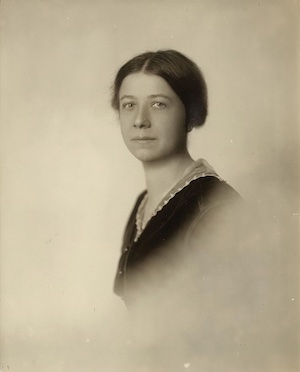“Action without study is fatal. Study without action is futile.”
—Mary Ritter Beard (ΦBK, DePauw University)
What is the purpose of higher education and why should a society value it? Throughout our history, the experiences of Phi Beta Kappa members have provided powerful stories and examples. Although not as widely known today as some of her fellow suffragists, Mary Ritter Beard helped organize the Woman Suffrage Procession on March 3, 1913, timed deliberately to take place the day before President Woodrow Wilson’s inauguration. Beard served as a marshal for the section of the parade that included many African American women, who she insisted should participate fully in the march. The following year, Beard coauthored a civics textbook for high school students. The next, she authored Woman’s Work in Municipalities, the first of six solo projects. A public intellectual and an activist, Beard later became a pioneering archivist instrumental in gathering the records of women’s history.
Beard’s quote about the connections between scholarship and action echoes, or perhaps rather reverberates more forcefully, an idea from Ralph Waldo Emerson’s “The American Scholar” address that serves as the inspiration for Phi Beta Kappa’s literary quarterly magazine of the same name. “Action is with the scholar subordinate, but it is essential. Without it, he is not yet man. Without it, thought can never ripen into truth.” Both remind us of a powerful through line of the Society: a belief in the power of ideas and informed debate to address pressing problems of the day.
More recently, a new book by Gayle Greene shows liberal arts and sciences education in action at a chapter institution. In Immeasurable Outcomes: Teaching Shakespeare in the Age of the Algorithm, Greene makes a powerful case that higher education should prepare students to live lives of inquiry, consequence, and accomplishments that serve themselves and the common good. Rejecting claims that the liberal arts and sciences aren’t practical, she demonstrates the importance of making a relationship-rich education available to more high school students in the wake of the pandemic. Instead of disruption and disaggregation, this goal should be the focus of administrators, policymakers, and decision makers. Greene concludes that it’s critical for higher education to show and tell the lived experiences of liberal arts and sciences graduates.
In many ways, the Society created the National Arts & Sciences Initiative to help Phi Beta Kappa members share the impact of the arts and sciences across the nation. You invested tremendous time and resources in earning a well-rounded arts and sciences education. When pundits, think tanks, and policymakers disparage it for click-bait and short-term wins, students and communities lose. This state legislative season, higher education is a topic generating broad conversations about the purpose of higher education, academic freedom, and inclusive excellence. If you want to add your voice to the conversation, please visit our updated Arts & Sciences Are Key toolkit (toolkit.pbk.org) for tips and suggestions.
In his reflections on action, Emerson also wisely acknowledged that “who has put forth total strength in fit actions, has the richest return of wisdom.” In creating opportunities for others to experience transformative education, we all benefit from a vibrant democracy and culture.
Photo at top: Mary Ritter Beard, 1914.




